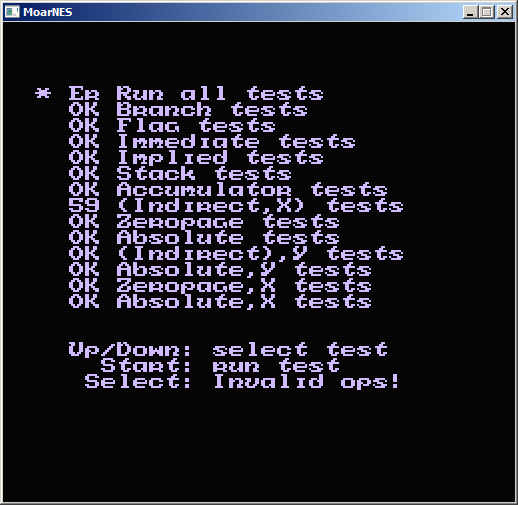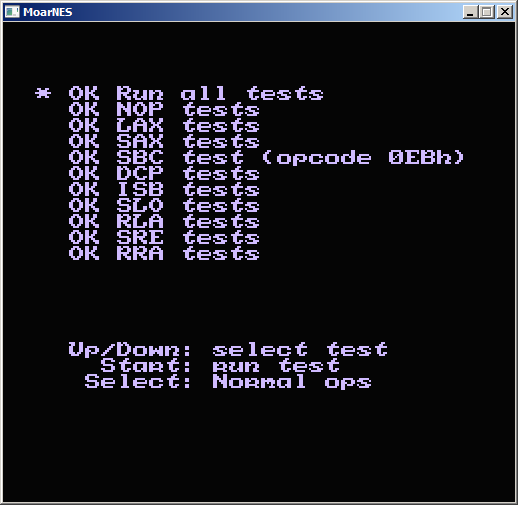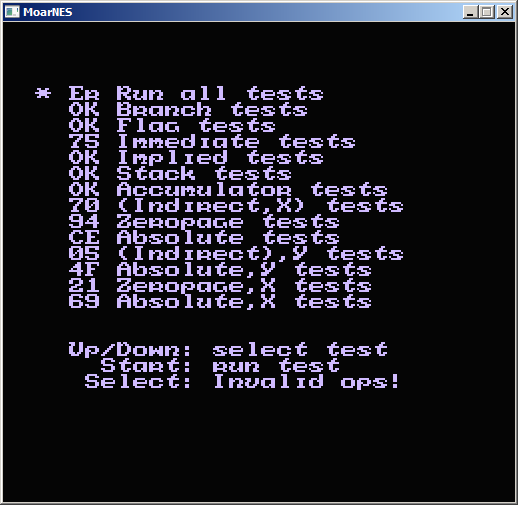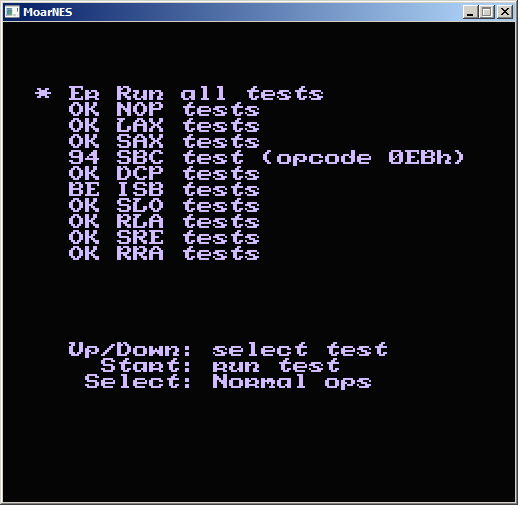ok, so yeah here's where i'm at...


(Indirect,X) test error: "059h - STA didn't store the data where it was supposed to"
i don't understand why there's a problem here. i am just going to paste all of the CPU emu code so you can see everything in context. it's very easy to read i think.
all of the functions for the various opcodes are in alphabetical order. functions to calculate effective addresses for the different addressing modes are near the top. opcodes start after it.
Code:
/* Fake6502 CPU emulator core v1.0 *******************
* (c)2011 Mike Chambers (miker00lz@gmail.com) *
*****************************************************
* v1.0 - First release (Nov. 24, 2011) *
*****************************************************
* Usage: *
* *
* Fake6502 requires you to provide two external *
* functions: *
* *
* uint8_t read6502(uint16_t address) *
* void write6502(uint16_t address, uint8_t value) *
* *
* You may optionally pass Fake6502 the pointer to a *
* function which you want to be called after every *
* emulated instruction. This function should be a *
* void with no parameters expected to be passed to *
* it. This can be very useful. For example, in a *
* NES emulator, you check the number of clock ticks *
* that have passed so you can know when to handle *
* APU events. *
* *
* To pass Fake6502 this pointer, use the *
* hookexternal(void *funcptr) function provided. *
* *
* To disable the hook later, pass NULL to it. *
*****************************************************
* Useful functions in this emulator: *
* *
* void reset6502() *
* - Call this once before you begin execution. *
* *
* void exec6502(uint32_t tickcount) *
* - Execute 6502 code up to the next specified *
* count of clock ticks. *
* *
* void irq6502() *
* - Trigger a hardware IRQ in the 6502 core. *
* *
* void nmi6502() *
* - Trigger an NMI in the 6502 core. *
* *
* void hookexternal(void *funcptr) *
* - Pass a pointer to a void function taking no *
* parameters. This will cause Fake6502 to call *
* that function once after each emulated *
* instruction. *
* *
*****************************************************
* Useful variables in this emulator: *
* *
* uint32_t clockticks6502 *
* - A running total of the emulated cycle count. *
* *
* uint32_t instructions *
* - A running total of the total emulated *
* instruction count. This is not related to *
* clock cycle timing. *
* *
*****************************************************/
#include <stdio.h>
#include <stdint.h>
//6502 defines
#define UNDOCUMENTED //when this is defined, undocumented opcodes are handled.
//otherwise, they're simply treated as NOPs.
#define NES_CPU //when this is defined, the binary-coded decimal (BCD)
//status flag is not honored by ADC and SBC. the 2A03
//CPU in the Nintendo Entertainment System does not
//support BCD operation.
#define FLAG_CARRY 0x01
#define FLAG_ZERO 0x02
#define FLAG_INTERRUPT 0x04
#define FLAG_DECIMAL 0x08
#define FLAG_BREAK 0x10
#define FLAG_CONSTANT 0x20
#define FLAG_OVERFLOW 0x40
#define FLAG_SIGN 0x80
#define BASE_STACK 0x100
//flag modifier macros
#define setcarry() status |= FLAG_CARRY
#define clearcarry() status &= (~FLAG_CARRY)
#define setzero() status |= FLAG_ZERO
#define clearzero() status &= (~FLAG_ZERO)
#define setinterrupt() status |= FLAG_INTERRUPT
#define clearinterrupt() status &= (~FLAG_INTERRUPT)
#define setdecimal() status |= FLAG_DECIMAL
#define cleardecimal() status &= (~FLAG_DECIMAL)
#define setbreak() status |= FLAG_BREAK
#define clearbreak() status &= (~FLAG_BREAK)
#define setoverflow() status |= FLAG_OVERFLOW
#define clearoverflow() status &= (~FLAG_OVERFLOW)
#define setsign() status |= FLAG_SIGN
#define clearsign() status &= (~FLAG_SIGN)
//6502 CPU registers
uint16_t pc;
uint8_t sp, a, x, y, status;
//helper variables
uint32_t instructions = 0; //keep track of total instructions executed
uint32_t clockticks6502 = 0, clockgoal6502 = 0;
uint16_t oldpc, ea, reladdr, value, result;
uint8_t opcode, oldstatus;
//externally supplied functions
extern uint8_t read6502(uint16_t address);
extern void write6502(uint16_t address, uint8_t value);
//a few general functions used by various other functions
void push16(uint16_t pushval) {
write6502(BASE_STACK + sp, (pushval >> 8) & 0xFF);
write6502(BASE_STACK + ((sp - 1) & 0xFF), pushval & 0xFF);
sp -= 2;
}
void push8(uint8_t pushval) {
write6502(BASE_STACK + sp--, pushval);
}
uint16_t pull16() {
uint16_t temp16;
temp16 = read6502(BASE_STACK + ((sp + 1) & 0xFF)) | ((uint16_t)read6502(BASE_STACK + ((sp + 2) & 0xFF)) << 8);
sp += 2;
return(temp16);
}
uint8_t pull8() {
return (read6502(BASE_STACK + ++sp));
}
void reset6502() {
pc = (uint16_t)read6502(0xFFFC) | ((uint16_t)read6502(0xFFFD) << 8);
a = 0;
x = 0;
y = 0;
sp = 0xFD;
status |= FLAG_CONSTANT;
}
//addressing mode functions, calculates effective addresses
static void imp() { //implied
}
static void acc() { //accumulator
}
static void imm() { //immediate
ea = pc++;
}
static void zp() { //zero-page
ea = (uint16_t)read6502((uint16_t)pc++);
}
static void zpx() { //zero-page,X
ea = ((uint16_t)read6502((uint16_t)pc++) + (uint16_t)x) & 0xFF; //zero-page wraparound
}
static void zpy() { //zero-page,Y
ea = ((uint16_t)read6502((uint16_t)pc++) + (uint16_t)y) & 0xFF; //zero-page wraparound
}
static void rel() { //relative for branch ops (8-bit immediate value, sign-extended)
reladdr = (uint16_t)read6502(pc++);
if (reladdr & 0x80) reladdr |= 0xFF00;
}
static void abso() { //absolute
ea = (uint16_t)read6502(pc) | ((uint16_t)read6502(pc+1) << 8);
pc += 2;
}
static void absx() { //absolute,X
ea = ((uint16_t)read6502(pc) | ((uint16_t)read6502(pc+1) << 8)) + (uint16_t)x;
pc += 2;
}
static void absy() { //absolute,Y
ea = ((uint16_t)read6502(pc) | ((uint16_t)read6502(pc+1) << 8)) + (uint16_t)y;
pc += 2;
}
static void ind() { //indirect
uint16_t eahelp, eahelp2;
eahelp = (uint16_t)read6502(pc) | (uint16_t)((uint16_t)read6502(pc+1) << 8);
eahelp2 = (eahelp & 0xFF00) | ((eahelp + 1) & 0x00FF); //replicate 6502 page-boundary wraparound bug
ea = (uint16_t)read6502(eahelp) | ((uint16_t)read6502(eahelp2) << 8);
pc += 2;
}
static void indx() { // (indirect,X)
uint16_t eahelp;
eahelp = (uint16_t)(((uint16_t)read6502(pc++) + (uint16_t)x) & 0xFF); //zero-page wraparound for table pointer
ea = (uint16_t)read6502(eahelp) | ((uint16_t)read6502(eahelp+1) << 8);
}
static void indy() { // (indirect),Y
uint16_t eahelp, eahelp2;
eahelp = (uint16_t)read6502(pc++);
eahelp2 = (eahelp & 0xFF00) | ((eahelp + 1) & 0x00FF); //zero-page wraparound
ea = (uint16_t)read6502(eahelp) | ((uint16_t)read6502(eahelp2) << 8);
ea += (uint16_t)y;
}
static void (*addrtable[256])();
static uint16_t getvalue() {
if (addrtable[opcode] == acc) return((uint16_t)a);
else return((uint16_t)read6502(ea));
}
static uint16_t getvalue16() {
return((uint16_t)read6502(ea) | ((uint16_t)read6502(ea+1) << 8));
}
static void putvalue(uint16_t saveval) {
if (addrtable[opcode] == acc) a = (uint8_t)(saveval & 0x00FF);
else write6502(ea, (saveval & 0x00FF));
}
#define zerocalc(n) {\
if ((n) & 0x00FF) clearzero();\
else setzero();\
}
#define signcalc(n) {\
if ((n) & 0x0080) setsign();\
else clearsign();\
}
#define carrycalc(n) {\
if ((n) & 0xFF00) setcarry();\
else clearcarry();\
}
#define overflowcalc(n, m, o) { /* n = result, m = accumulator, o = memory */ \
if (((n) ^ (uint16_t)(m)) & ((n) ^ (o)) & 0x0080) setoverflow();\
else clearoverflow();\
}
#define saveaccum(n) a = (uint8_t)((n) & 0x00FF)
//instruction handler functions
static void adc() {
value = getvalue();
result = (uint16_t)a + value + (uint16_t)(status & FLAG_CARRY);
carrycalc(result);
zerocalc(result);
overflowcalc(result, a, value);
signcalc(result);
#ifndef NES_CPU
if (status & FLAG_DECIMAL) {
clearcarry();
if ((a & 0x0F) > 0x09) {
a += 0x06;
}
if ((a & 0xF0) > 0x90) {
a += 0x60;
setcarry();
}
clockticks6502++;
}
#endif
saveaccum(result);
}
static void and() {
value = getvalue();
result = (uint16_t)a & value;
zerocalc(result);
signcalc(result);
saveaccum(result);
}
static void asl() {
value = getvalue();
result = value << 1;
carrycalc(result);
zerocalc(result);
signcalc(result);
putvalue(result);
}
static void bcc() {
if ((status & FLAG_CARRY) == 0) {
oldpc = pc;
pc += reladdr;
if ((oldpc & 0xFF00) != (pc & 0xFF00)) clockticks6502 += 2; //check if jump crossed a page boundary
else clockticks6502++;
}
}
static void bcs() {
if ((status & FLAG_CARRY) == FLAG_CARRY) {
oldpc = pc;
pc += reladdr;
if ((oldpc & 0xFF00) != (pc & 0xFF00)) clockticks6502 += 2; //check if jump crossed a page boundary
else clockticks6502++;
}
}
static void beq() {
if ((status & FLAG_ZERO) == FLAG_ZERO) {
oldpc = pc;
pc += reladdr;
if ((oldpc & 0xFF00) != (pc & 0xFF00)) clockticks6502 += 2; //check if jump crossed a page boundary
else clockticks6502++;
}
}
static void bit() {
value = getvalue();
result = (uint16_t)a & value;
zerocalc(result);
status = (status & 0xBF) | (uint8_t)(value & 0xC0);
}
static void bmi() {
if ((status & FLAG_SIGN) == FLAG_SIGN) {
oldpc = pc;
pc += reladdr;
if ((oldpc & 0xFF00) != (pc & 0xFF00)) clockticks6502 += 2; //check if jump crossed a page boundary
else clockticks6502++;
}
}
static void bne() {
if ((status & FLAG_ZERO) == 0) {
oldpc = pc;
pc += reladdr;
if ((oldpc & 0xFF00) != (pc & 0xFF00)) clockticks6502 += 2; //check if jump crossed a page boundary
else clockticks6502++;
}
}
static void bpl() {
if ((status & FLAG_SIGN) == 0) {
oldpc = pc;
pc += reladdr;
if ((oldpc & 0xFF00) != (pc & 0xFF00)) clockticks6502 += 2; //check if jump crossed a page boundary
else clockticks6502++;
}
}
static void brk() {
pc++;
push16(pc); //push next instruction address onto stack
setbreak(); //set break flag
push8(status); //push CPU status to stack
setinterrupt(); //set interrupt flag
pc = (uint16_t)read6502(0xFFFE) | ((uint16_t)read6502(0xFFFF) << 8);
}
static void bvc() {
if ((status & FLAG_OVERFLOW) == 0) {
oldpc = pc;
pc += reladdr;
if ((oldpc & 0xFF00) != (pc & 0xFF00)) clockticks6502 += 2; //check if jump crossed a page boundary
else clockticks6502++;
}
}
static void bvs() {
if ((status & FLAG_OVERFLOW) == FLAG_OVERFLOW) {
oldpc = pc;
pc += reladdr;
if ((oldpc & 0xFF00) != (pc & 0xFF00)) clockticks6502 += 2; //check if jump crossed a page boundary
else clockticks6502++;
}
}
static void clc() {
clearcarry();
}
static void cld() {
cleardecimal();
}
static void cli() {
clearinterrupt();
}
static void clv() {
clearoverflow();
}
static void cmp() {
value = getvalue();
result = (uint16_t)a - value;
if (a >= (uint8_t)(value & 0x00FF)) setcarry();
else clearcarry();
if (a == (uint8_t)(value & 0x00FF)) setzero();
else clearzero();
signcalc(result);
}
static void cpx() {
value = getvalue();
result = (uint16_t)x - value;
if (x >= (uint8_t)(value & 0x00FF)) setcarry();
else clearcarry();
if (x == (uint8_t)(value & 0x00FF)) setzero();
else clearzero();
signcalc(result);
}
static void cpy() {
value = getvalue();
result = (uint16_t)y - value;
if (y >= (uint8_t)(value & 0x00FF)) setcarry();
else clearcarry();
if (y == (uint8_t)(value & 0x00FF)) setzero();
else clearzero();
signcalc(result);
}
static void dec() {
value = getvalue();
result = value - 1;
zerocalc(result);
signcalc(result);
putvalue(result);
}
static void dex() {
x--;
zerocalc(x);
signcalc(x);
}
static void dey() {
y--;
zerocalc(y);
signcalc(y);
}
static void eor() {
value = getvalue();
result = (uint16_t)a ^ value;
zerocalc(result);
signcalc(result);
saveaccum(result);
}
static void inc() {
value = getvalue();
result = value + 1;
zerocalc(result);
signcalc(result);
putvalue(result);
}
static void inx() {
x++;
zerocalc(x);
signcalc(x);
}
static void iny() {
y++;
zerocalc(y);
signcalc(y);
}
static void jmp() {
pc = ea;
}
static void jsr() {
push16(pc - 1);
pc = ea;
}
static void lda() {
value = getvalue();
a = (uint8_t)(value & 0x00FF);
zerocalc(a);
signcalc(a);
}
static void ldx() {
value = getvalue();
x = (uint8_t)(value & 0x00FF);
zerocalc(x);
signcalc(x);
}
static void ldy() {
value = getvalue();
y = (uint8_t)(value & 0x00FF);
zerocalc(y);
signcalc(y);
}
static void lsr() {
value = getvalue();
result = value >> 1;
if (value & 1) setcarry();
else clearcarry();
zerocalc(result);
signcalc(result);
putvalue(result);
}
static void nop() {
}
static void ora() {
value = getvalue();
result = (uint16_t)a | value;
zerocalc(result);
signcalc(result);
saveaccum(result);
}
static void pha() {
push8(a);
}
static void php() {
push8(status);
}
static void pla() {
a = pull8();
zerocalc(a);
signcalc(a);
}
static void plp() {
status = pull8() | FLAG_CONSTANT;
}
static void rol() {
value = getvalue();
result = (value << 1) | (status & FLAG_CARRY);
carrycalc(result);
zerocalc(result);
signcalc(result);
putvalue(result);
}
static void ror() {
value = getvalue();
result = (value >> 1) | ((status & FLAG_CARRY) << 7);
if (value & 1) setcarry();
else clearcarry();
zerocalc(result);
signcalc(result);
putvalue(result);
}
static void rti() {
status = pull8();
value = pull16();
pc = value;
}
static void rts() {
value = pull16();
pc = value + 1;
}
static void sbc() {
value = getvalue() ^ 0x00FF;
result = (uint16_t)a + value + (uint16_t)(status & FLAG_CARRY);
carrycalc(result);
zerocalc(result);
overflowcalc(result, a, value);
signcalc(result);
#ifndef NES_CPU
if (status & FLAG_DECIMAL) {
clearcarry();
a -= 0x66;
if ((a & 0x0F) > 0x09) {
a += 0x06;
}
if ((a & 0xF0) > 0x90) {
a += 0x60;
setcarry();
}
clockticks6502++;
}
#endif
saveaccum(result);
}
static void sec() {
setcarry();
}
static void sed() {
setdecimal();
}
static void sei() {
setinterrupt();
}
static void sta() {
putvalue(a);
}
static void stx() {
putvalue(x);
}
static void sty() {
putvalue(y);
}
static void tax() {
x = a;
zerocalc(x);
signcalc(x);
}
static void tay() {
y = a;
zerocalc(y);
signcalc(y);
}
static void tsx() {
x = sp;
zerocalc(x);
signcalc(x);
}
static void txa() {
a = x;
zerocalc(a);
signcalc(a);
}
static void txs() {
sp = x;
}
static void tya() {
a = y;
zerocalc(a);
signcalc(a);
}
//undocumented instructions
#ifdef UNDOCUMENTED
static void lax() {
lda();
ldx();
}
static void sax() {
sta();
stx();
putvalue(a & x);
}
static void dcp() {
dec();
cmp();
}
static void isb() {
inc();
sbc();
}
static void slo() {
asl();
ora();
}
static void rla() {
rol();
and();
}
static void sre() {
lsr();
eor();
}
static void rra() {
ror();
adc();
}
#else
#define lax nop
#define sax nop
#define dcp nop
#define isb nop
#define slo nop
#define rla nop
#define sre nop
#define rra nop
#endif
static void (*addrtable[256])() = {
/* | 0 | 1 | 2 | 3 | 4 | 5 | 6 | 7 | 8 | 9 | A | B | C | D | E | F | */
/* 0 */ imp, indx, imp, indx, zp, zp, zp, zp, imp, imm, acc, imm, abso, abso, abso, abso, /* 0 */
/* 1 */ rel, indy, imp, indy, zpx, zpx, zpx, zpx, imp, absy, imp, absy, absx, absx, absx, absx, /* 1 */
/* 2 */ abso, indx, imp, indx, zp, zp, zp, zp, imp, imm, acc, imm, abso, abso, abso, abso, /* 2 */
/* 3 */ rel, indy, imp, indy, zpx, zpx, zpx, zpx, imp, absy, imp, absy, absx, absx, absx, absx, /* 3 */
/* 4 */ imp, indx, imp, indx, zp, zp, zp, zp, imp, imm, acc, imm, abso, abso, abso, abso, /* 4 */
/* 5 */ rel, indy, imp, indy, zpx, zpx, zpx, zpx, imp, absy, imp, absy, absx, absx, absx, absx, /* 5 */
/* 6 */ imp, indx, imp, indx, zp, zp, zp, zp, imp, imm, acc, imm, ind, abso, abso, abso, /* 6 */
/* 7 */ rel, indy, imp, indy, zpx, zpx, zpx, zpx, imp, absy, imp, absy, absx, absx, absx, absx, /* 7 */
/* 8 */ imm, indx, imm, indx, zp, zp, zp, zp, imp, imm, imp, imm, abso, abso, abso, abso, /* 8 */
/* 9 */ rel, indy, imp, indy, zpx, zpx, zpy, zpy, imp, absy, imp, absy, absx, absx, absy, absy, /* 9 */
/* A */ imm, indx, imm, indx, zp, zp, zp, zp, imp, imm, imp, imm, abso, abso, abso, abso, /* A */
/* B */ rel, indy, imp, indy, zpx, zpx, zpy, zpy, imp, absy, imp, absy, absx, absx, absy, absy, /* B */
/* C */ imm, indx, imm, indx, zp, zp, zp, zp, imp, imm, imp, imm, abso, abso, abso, abso, /* C */
/* D */ rel, indy, imp, indy, zpx, zpx, zpx, zpx, imp, absy, imp, absy, absx, absx, absx, absx, /* D */
/* E */ imm, indx, imm, indx, zp, zp, zp, zp, imp, imm, imp, imm, abso, abso, abso, abso, /* E */
/* F */ rel, indy, imp, indy, zpx, zpx, zpx, zpx, imp, absy, imp, absy, absx, absx, absx, absx /* F */
};
static void (*optable[256])() = {
/* | 0 | 1 | 2 | 3 | 4 | 5 | 6 | 7 | 8 | 9 | A | B | C | D | E | F | */
/* 0 */ brk, ora, nop, slo, nop, ora, asl, slo, php, ora, asl, nop, nop, ora, asl, slo, /* 0 */
/* 1 */ bpl, ora, nop, slo, nop, ora, asl, slo, clc, ora, nop, slo, nop, ora, asl, slo, /* 1 */
/* 2 */ jsr, and, nop, rla, bit, and, rol, rla, plp, and, rol, nop, bit, and, rol, rla, /* 2 */
/* 3 */ bmi, and, nop, rla, nop, and, rol, rla, sec, and, nop, rla, nop, and, rol, rla, /* 3 */
/* 4 */ rti, eor, nop, sre, nop, eor, lsr, sre, pha, eor, lsr, nop, jmp, eor, lsr, sre, /* 4 */
/* 5 */ bvc, eor, nop, sre, nop, eor, lsr, sre, cli, eor, nop, sre, nop, eor, lsr, sre, /* 5 */
/* 6 */ rts, adc, nop, rra, nop, adc, ror, rra, pla, adc, ror, nop, jmp, adc, ror, rra, /* 6 */
/* 7 */ bvs, adc, nop, rra, nop, adc, ror, rra, sei, adc, nop, rra, nop, adc, ror, rra, /* 7 */
/* 8 */ nop, sta, nop, sax, sty, sta, stx, sax, dey, nop, txa, nop, sty, sta, stx, sax, /* 8 */
/* 9 */ bcc, sta, nop, nop, sty, sta, stx, sax, tya, sta, txs, nop, nop, sta, nop, nop, /* 9 */
/* A */ ldy, lda, ldx, lax, ldy, lda, ldx, lax, tay, lda, tax, nop, ldy, lda, ldx, lax, /* A */
/* B */ bcs, lda, nop, lax, ldy, lda, ldx, lax, clv, lda, tsx, nop, ldy, lda, ldx, lax, /* B */
/* C */ cpy, cmp, nop, dcp, cpy, cmp, dec, dcp, iny, cmp, dex, nop, cpy, cmp, dec, dcp, /* C */
/* D */ bne, cmp, nop, dcp, nop, cmp, dec, dcp, cld, cmp, nop, dcp, nop, cmp, dec, dcp, /* D */
/* E */ cpx, sbc, nop, isb, cpx, sbc, inc, isb, inx, sbc, nop, sbc, cpx, sbc, inc, isb, /* E */
/* F */ beq, sbc, nop, isb, nop, sbc, inc, isb, sed, sbc, nop, isb, nop, sbc, inc, isb /* F */
};
static const uint32_t ticktable[256] = {
/* | 0 | 1 | 2 | 3 | 4 | 5 | 6 | 7 | 8 | 9 | A | B | C | D | E | F | */
/* 0 */ 7, 6, 2, 8, 3, 3, 5, 5, 3, 2, 2, 2, 4, 4, 6, 6, /* 0 */
/* 1 */ 2, 5, 2, 8, 4, 4, 6, 6, 2, 4, 2, 7, 5, 5, 7, 7, /* 1 */
/* 2 */ 6, 6, 2, 8, 3, 3, 5, 5, 4, 2, 2, 2, 4, 4, 6, 6, /* 2 */
/* 3 */ 2, 5, 2, 8, 4, 4, 6, 6, 2, 4, 2, 7, 5, 5, 7, 7, /* 3 */
/* 4 */ 6, 6, 2, 8, 3, 3, 5, 5, 3, 2, 2, 2, 3, 4, 6, 6, /* 4 */
/* 5 */ 2, 5, 2, 8, 4, 4, 6, 6, 2, 4, 2, 7, 5, 5, 7, 7, /* 5 */
/* 6 */ 6, 6, 2, 8, 3, 3, 5, 5, 4, 2, 2, 2, 5, 4, 6, 6, /* 6 */
/* 7 */ 2, 5, 2, 8, 4, 4, 6, 6, 2, 4, 2, 7, 5, 5, 7, 7, /* 7 */
/* 8 */ 2, 6, 2, 6, 3, 3, 3, 3, 2, 2, 2, 2, 4, 4, 4, 4, /* 8 */
/* 9 */ 2, 6, 2, 6, 4, 4, 4, 4, 2, 5, 2, 5, 5, 5, 5, 5, /* 9 */
/* A */ 2, 6, 2, 6, 3, 3, 3, 3, 2, 2, 2, 2, 4, 4, 4, 4, /* A */
/* B */ 2, 5, 2, 5, 4, 4, 4, 4, 2, 4, 2, 5, 4, 4, 4, 4, /* B */
/* C */ 2, 6, 2, 8, 3, 3, 5, 5, 2, 2, 2, 2, 4, 4, 6, 6, /* C */
/* D */ 2, 5, 2, 8, 4, 4, 6, 6, 2, 4, 2, 7, 5, 5, 7, 7, /* D */
/* E */ 2, 6, 2, 8, 3, 3, 5, 5, 2, 2, 2, 2, 4, 4, 6, 6, /* E */
/* F */ 2, 5, 2, 8, 4, 4, 6, 6, 2, 4, 2, 7, 5, 5, 7, 7 /* F */
};
void nmi6502() {
push16(pc);
push8(status);
status |= FLAG_INTERRUPT;
pc = (uint16_t)read6502(0xFFFA) | ((uint16_t)read6502(0xFFFB) << 8);
}
void irq6502() {
push16(pc);
push8(status);
status |= FLAG_INTERRUPT;
pc = (uint16_t)read6502(0xFFFE) | ((uint16_t)read6502(0xFFFF) << 8);
}
//can use loopexternal to call an external function after every instruction.
//use hookexternal(void *funcptr) function to pass a pointer to one.
//pass NULL to hookexternal to disable.
uint8_t callexternal = 0;
void (*loopexternal)();
void exec6502(uint32_t tickcount) {
clockgoal6502 += tickcount;
static uint16_t lastpc;
while (clockticks6502 < clockgoal6502) {
opcode = read6502(pc++);
lastpc = pc;
status |= FLAG_CONSTANT;
(*addrtable[opcode])();
(*optable[opcode])();
clockticks6502 += ticktable[opcode];
instructions++;
if (callexternal) (*loopexternal)();
}
}
void hookexternal(void *funcptr) {
if (funcptr != (void *)NULL) {
loopexternal = funcptr;
callexternal = 1;
} else callexternal = 0;
}
i know doing all the addressing calcs and instructions as functions from a pointer table isn't the most efficient, but it's just a NES. it benchmarks around 40-45 million instructions per second on most game ROMs with no speed limiting on my Phenom II X4 955. it's fast enough.





